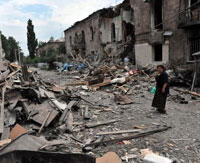War in South Ossetia reflects profound deficits in US policy
Georgia made a "grave mistake" in advancing into the breakaway province of South Ossetia without adequate preparation, former President Eduard Shevardnadze was quoted as saying Wednesday.

Georgia launched an offensive last week to regain control over the region, which has close ties to Moscow — triggering a furious response from Moscow. Pro-Western President Mikhail Saakashvili charged that Russia aimed to "destroy" his nation, a former Soviet republic.
In an interview with the German daily Bild, Shevardnadze declined to respond directly when asked his opinion of Saakashvili, who came to power in 2004 after leading street demonstrations that ousted his government.
"We have a tradition that, in times of crisis, the opposition stands united behind the president and does not attack him," he was quoted as saying. "But Georgia should not have advanced into Tskhinvali (South Ossetia's capital) in so unprepared a way. That was a grave error."
The crisis over Georgia has strained Russia's relations with the West. Shevardnadze, a former Soviet foreign minister, said the issue of Georgia in itself would not cause a new Cold War, the AP reports.
Pravda.Ru has asked Middle East expert Flynt Leverett to comment on the conflict between Georgia and South Ossetia.
(Dr. Leverett is a senior fellow and director of the Geopolitics of Energy Initiative at the New America Foundation. He has had a distinguished career in government, serving as senior director for Middle East affairs at the National Security Council, Middle East expert on the Secretary of State’s Policy Planning Staff, and Senior Analyst at the Central Intelligence Agency.)
“Of course, everyone regrets the loss of life in South Ossetia and hopes that the situation can be resolved without further bloodshed. From a strategic perspective, the current conflict reflects the profound deficits in Western, and especially U.S. policy toward Russia and other former Soviet states. Two deficits are particularly relevant here.
First, the United States has willfully ignored the resurgence of Russia’s influence and standing on the international stage in recent years. This increase in influence and standing is rooted not only in Russian policy choices in recent years, but also in structural changes in international politics and the global economy—such as structural shifts in global energy markets and the declining international economic position of the United States. Policymakers in both the Democratic and Republican parties seem locked in the mindset of the 1990s—that Russia is weak, the United States does not have to take Russian interests into account, and can simply pursue a maximalist foreign policy agenda toward Russia and other former Soviet states without having to prioritize its objectives.
Second, the United States has pursued an ideologically-driven campaign of “democracy promotion” in former Soviet states. It has compounded this unwise policy by pushing for recognition of Kosovo’s independence outside the United Nations Security Council.
Under these circumstances, it was only a matter of time before Russia sought to “push back” against what Moscow sees as deliberate Western provocations and violations of important Russian interests. My own view is that Russia still wants an effective strategic partnership with the United States, and the West more generally. However, Moscow expects such a partnership to be built on “give and take”, not uncompensated acquiescence to American dictates. I hope that the next U.S. administration will be more serious than the Bush Administration about meaningful partnership with Russia.”
Prepared by Alexander Timoshik
Pravda.Ru
Subscribe to Pravda.Ru Telegram channel, Facebook, RSS!

